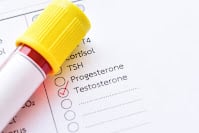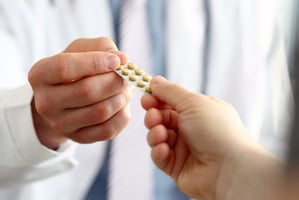Low and High Testosterone Associated With PTSD Symptoms in Males and Females

In both males and females, low levels of testosterone may be a risk factor for future posttraumatic stress disorder (PTSD) symptoms, according to a study published yesterday in Translational Psychiatry. Elevated testosterone was also associated with PTSD symptom risk, while individuals in the middle had the lowest risk.
“Our findings are consistent with previous work that has shown testosterone to have anxiolytic and antidepressant effects in men,” wrote Hanyang Shen, M.P.H., M.Sc., of Stanford University, and colleagues. “In women, there is also some evidence that testosterone can have anxiolytic and antidepressant effects, but high levels may also lead to new onset mood episodes.”
The researchers made use of the vast UK Biobank repository, which contains medical, genetic, social, lifestyle, and environmental data on more than 500,000 middle-aged adults. Their sample included 62,565 males (average age 57) and 67,906 females (average age 55) who completed a mental health questionnaire mailed out in 2016 and had previously provided blood samples; the researchers excluded individuals whose baseline testosterone was at the extreme low or high end of normal human range. The mental health questionnaire included six questions on PTSD symptoms derived from the PTSD Checklist for DSM-5.
Male and female participants were then divided into 10 groups (deciles) based on total testosterone (TT) levels, with group one (lowest levels) serving as the reference. Shen and colleagues found that relative to group one, all other groups had lower PTSD symptom scores, after adjusting for other variables. The scores exhibited a U-shaped pattern, with decile seven associated with the fewest PTSD symptoms in both males (TT range of 12.54 to 13.50 nmol/L) and females (TT range of 1.11 to 1.25 nmol/L).
Among both males and females, stronger associations between testosterone levels and future PTSD symptoms were seen in adults with a BMI of 30 or higher.
“Analyzing data from 130,471 participants, this study is over 60 times larger than the largest previous investigation of the relationship between testosterone and future PTSD symptoms, affording the testing of more nuanced models than previously investigated,” the researchers wrote. “[M]ore studies exploring how BMI, and other body composition measures that more directly distinguish body fat from muscle, modify the impact of testosterone on psychiatric disorders need to be conducted to further unveil this mechanism.”
For related information, see the Psychiatric News article “Can Hormonal Treatments Help Your Patients?”
(Image: Getty Images/iStock/jarun011)
Don't miss out! To learn about newly posted articles in Psychiatric News, please sign up here.





